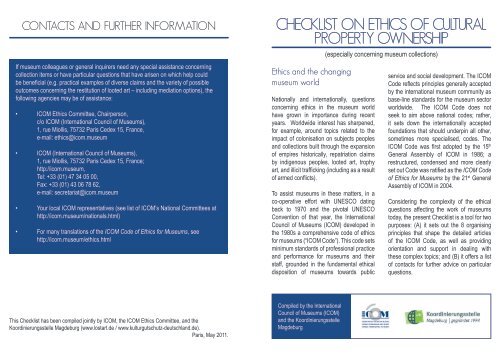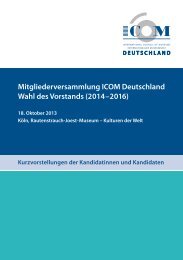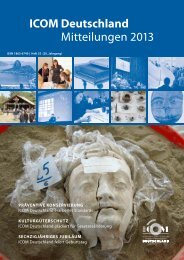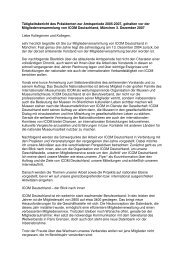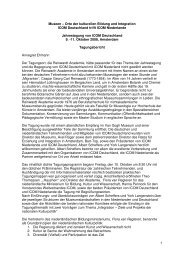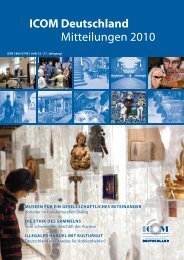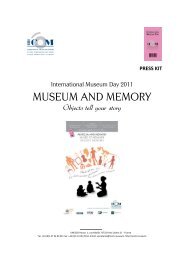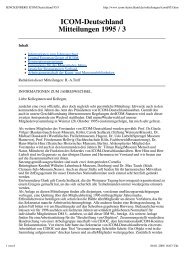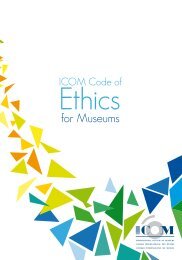CheCklist on ethiCs of Cultural property ownership - ICOM
CheCklist on ethiCs of Cultural property ownership - ICOM
CheCklist on ethiCs of Cultural property ownership - ICOM
You also want an ePaper? Increase the reach of your titles
YUMPU automatically turns print PDFs into web optimized ePapers that Google loves.
C<strong>on</strong>tacts and further informati<strong>on</strong><br />
If museum colleagues or general inquirers need any special assistance c<strong>on</strong>cerning<br />
collecti<strong>on</strong> items or have particular questi<strong>on</strong>s that have arisen <strong>on</strong> which help could<br />
be beneficial (e.g. practical examples <strong>of</strong> diverse claims and the variety <strong>of</strong> possible<br />
outcomes c<strong>on</strong>cerning the restituti<strong>on</strong> <strong>of</strong> looted art – including mediati<strong>on</strong> opti<strong>on</strong>s), the<br />
following agencies may be <strong>of</strong> assistance:<br />
• <strong>ICOM</strong> Ethics Committee, Chairpers<strong>on</strong>,<br />
c/o <strong>ICOM</strong> (Internati<strong>on</strong>al Council <strong>of</strong> Museums),<br />
1, rue Miollis, 75732 Paris Cedex 15, France,<br />
e-mail: ethics@icom.museum<br />
• <strong>ICOM</strong> (Internati<strong>on</strong>al Council <strong>of</strong> Museums),<br />
1, rue Miollis, 75732 Paris Cedex 15, France;<br />
http://icom.museum,<br />
Tel: +33 (01) 47 34 05 00,<br />
Fax: +33 (01) 43 06 78 62,<br />
e-mail: secretariat@icom.museum<br />
• Your local <strong>ICOM</strong> representatives (see list <strong>of</strong> <strong>ICOM</strong>’s Nati<strong>on</strong>al Committees at<br />
http://icom.museum/nati<strong>on</strong>als.html)<br />
• For many translati<strong>on</strong>s <strong>of</strong> the <strong>ICOM</strong> Code <strong>of</strong> Ethics for Museums, see<br />
http://icom.museum/ethics.html<br />
Checklist <strong>on</strong> ethics <strong>of</strong> cultural<br />
<strong>property</strong> <strong>ownership</strong><br />
Ethics and the changing<br />
museum world<br />
Nati<strong>on</strong>ally and internati<strong>on</strong>ally, questi<strong>on</strong>s<br />
c<strong>on</strong>cerning ethics in the museum world<br />
have grown in importance during recent<br />
years. Worldwide interest has sharpened,<br />
for example, around topics related to the<br />
impact <strong>of</strong> col<strong>on</strong>isati<strong>on</strong> <strong>on</strong> subjects peoples<br />
and collecti<strong>on</strong>s built through the expansi<strong>on</strong><br />
<strong>of</strong> empires historically, repatriati<strong>on</strong> claims<br />
by indigenous peoples, looted art, trophy<br />
art, and illicit trafficking (including as a result<br />
<strong>of</strong> armed c<strong>on</strong>flicts).<br />
To assist museums in these matters, in a<br />
co-operative effort with UNESCO dating<br />
back to 1970 and the pivotal UNESCO<br />
C<strong>on</strong>venti<strong>on</strong> <strong>of</strong> that year, the Internati<strong>on</strong>al<br />
Council <strong>of</strong> Museums (<strong>ICOM</strong>) developed in<br />
the 1980s a comprehensive code <strong>of</strong> ethics<br />
for museums (“<strong>ICOM</strong> Code”). This code sets<br />
minimum standards <strong>of</strong> pr<strong>of</strong>essi<strong>on</strong>al practice<br />
and performance for museums and their<br />
staff, grounded in the fundamental ethical<br />
dispositi<strong>on</strong> <strong>of</strong> museums towards public<br />
(especially c<strong>on</strong>cerning museum collecti<strong>on</strong>s)<br />
service and social development. The <strong>ICOM</strong><br />
Code reflects principles generally accepted<br />
by the internati<strong>on</strong>al museum community as<br />
base-line standards for the museum sector<br />
worldwide. The <strong>ICOM</strong> Code does not<br />
seek to aim above nati<strong>on</strong>al codes; rather,<br />
it sets down the internati<strong>on</strong>ally accepted<br />
foundati<strong>on</strong>s that should underpin all other,<br />
sometimes more specialised, codes. The<br />
<strong>ICOM</strong> Code was first adopted by the 15 th<br />
General Assembly <strong>of</strong> <strong>ICOM</strong> in 1986; a<br />
restructured, c<strong>on</strong>densed and more clearly<br />
set out Code was ratified as the <strong>ICOM</strong> Code<br />
<strong>of</strong> Ethics for Museums by the 21 st General<br />
Assembly <strong>of</strong> <strong>ICOM</strong> in 2004.<br />
C<strong>on</strong>sidering the complexity <strong>of</strong> the ethical<br />
questi<strong>on</strong>s affecting the work <strong>of</strong> museums<br />
today, the present Checklist is a tool for two<br />
purposes: (A) it sets out the 8 organising<br />
principles that shape the detailed articles<br />
<strong>of</strong> the <strong>ICOM</strong> Code, as well as providing<br />
orientati<strong>on</strong> and support in dealing with<br />
these complex topics; and (B) it <strong>of</strong>fers a list<br />
<strong>of</strong> c<strong>on</strong>tacts for further advice <strong>on</strong> particular<br />
questi<strong>on</strong>s.<br />
This Checklist has been compiled jointly by <strong>ICOM</strong>, the <strong>ICOM</strong> Ethics Committee, and the<br />
Koordinierungsstelle Magdeburg (www.lostart.de / www.kulturgutschutz-deutschland.de).<br />
Paris, May 2011.<br />
Compiled by the Internati<strong>on</strong>al<br />
Council <strong>of</strong> Museums (<strong>ICOM</strong>)<br />
and the Koordinierungsstelle<br />
Magdeburg
The Principles <strong>of</strong><br />
the <strong>ICOM</strong> Code <strong>of</strong> Ethics for Museums<br />
1. Museums preserve, interpret and promote the<br />
natural and cultural inheritance <strong>of</strong> humanity<br />
Museums are resp<strong>on</strong>sible for the tangible and intangible natural and cultural heritage.<br />
Governing bodies and those c<strong>on</strong>cerned with the strategic directi<strong>on</strong> and oversight <strong>of</strong><br />
museums have a primary resp<strong>on</strong>sibility to protect and promote this heritage as well as the<br />
human, physical and financial resources made available for that purpose.<br />
2. Museums that maintain collecti<strong>on</strong>s hold them in trust<br />
for the benefit <strong>of</strong> society and its development<br />
Museums have the duty to acquire, preserve and promote their collecti<strong>on</strong>s as a c<strong>on</strong>tributi<strong>on</strong><br />
to safeguarding the natural, cultural and scientific heritage. Their collecti<strong>on</strong>s are a significant<br />
public inheritance, have a special positi<strong>on</strong> in law and are protected by internati<strong>on</strong>al<br />
legislati<strong>on</strong>. Inherent in this public trust is the noti<strong>on</strong> <strong>of</strong> stewardship that includes rightful<br />
<strong>ownership</strong>, provenance, permanence, documentati<strong>on</strong>, accessibility and resp<strong>on</strong>sible<br />
disposal.<br />
3. Museums hold primary evidence for establishing<br />
and furthering knowledge<br />
Museums have particular resp<strong>on</strong>sibilities to all for the care, accessibility and interpretati<strong>on</strong> <strong>of</strong><br />
primary evidence collected and held in their collecti<strong>on</strong>s.<br />
4. Museums provide opportunities for the<br />
appreciati<strong>on</strong>, understanding and promoti<strong>on</strong> <strong>of</strong> the natural<br />
and cultural heritage<br />
Museums have an important duty to develop their educati<strong>on</strong>al role and attract wider<br />
audiences from the community, locality, or group they serve. Interacti<strong>on</strong> with the c<strong>on</strong>stituent<br />
community and promoti<strong>on</strong> <strong>of</strong> their heritage is an integral part <strong>of</strong> the educati<strong>on</strong>al role <strong>of</strong> the<br />
museum.<br />
5. Museums hold resources that provide opportunities<br />
for other public services and benefits<br />
Museums utilise a wide variety <strong>of</strong> specialisms, skills and physical resources that have a far<br />
broader applicati<strong>on</strong> than in the museum. This may lead to shared resources or the provisi<strong>on</strong><br />
<strong>of</strong> services as an extensi<strong>on</strong> <strong>of</strong> the museum’s activities. These should be organized in such a<br />
way that they do not compromise the museum’s stated missi<strong>on</strong>.<br />
6. Museums work in close collaborati<strong>on</strong> with the<br />
communities from which their collecti<strong>on</strong>s originate as well<br />
as those they serve<br />
Museum collecti<strong>on</strong>s reflect the cultural and natural heritage <strong>of</strong> the communities from which<br />
they have been derived. As such they have a character bey<strong>on</strong>d that <strong>of</strong> ordinary <strong>property</strong><br />
which may include str<strong>on</strong>g affinities with nati<strong>on</strong>al, regi<strong>on</strong>al, local, ethnic, religious or political<br />
identity. It is important therefore that museum policy is resp<strong>on</strong>sive to this possibility.<br />
7. Museums operate in a legal manner<br />
Museums must c<strong>on</strong>form fully to internati<strong>on</strong>al, regi<strong>on</strong>al, nati<strong>on</strong>al, or local legislati<strong>on</strong> and<br />
treaty obligati<strong>on</strong>s. In additi<strong>on</strong>, the governing body should comply with any legally binding<br />
trusts or c<strong>on</strong>diti<strong>on</strong>s relating to any aspect <strong>of</strong> the museum, its collecti<strong>on</strong>s and operati<strong>on</strong>s.<br />
8. Museums operate in a pr<strong>of</strong>essi<strong>on</strong>al manner<br />
Members <strong>of</strong> the museum pr<strong>of</strong>essi<strong>on</strong> should observe accepted standards and laws and<br />
uphold the dignity and h<strong>on</strong>our <strong>of</strong> their pr<strong>of</strong>essi<strong>on</strong>. They should safeguard the public against<br />
illegal or unethical pr<strong>of</strong>essi<strong>on</strong>al c<strong>on</strong>duct. Every opportunity should be used to inform and<br />
educate the public about the aims, purposes, and aspirati<strong>on</strong>s <strong>of</strong> the pr<strong>of</strong>essi<strong>on</strong> to develop a<br />
better public understanding <strong>of</strong> the c<strong>on</strong>tributi<strong>on</strong>s <strong>of</strong> museums to society.


